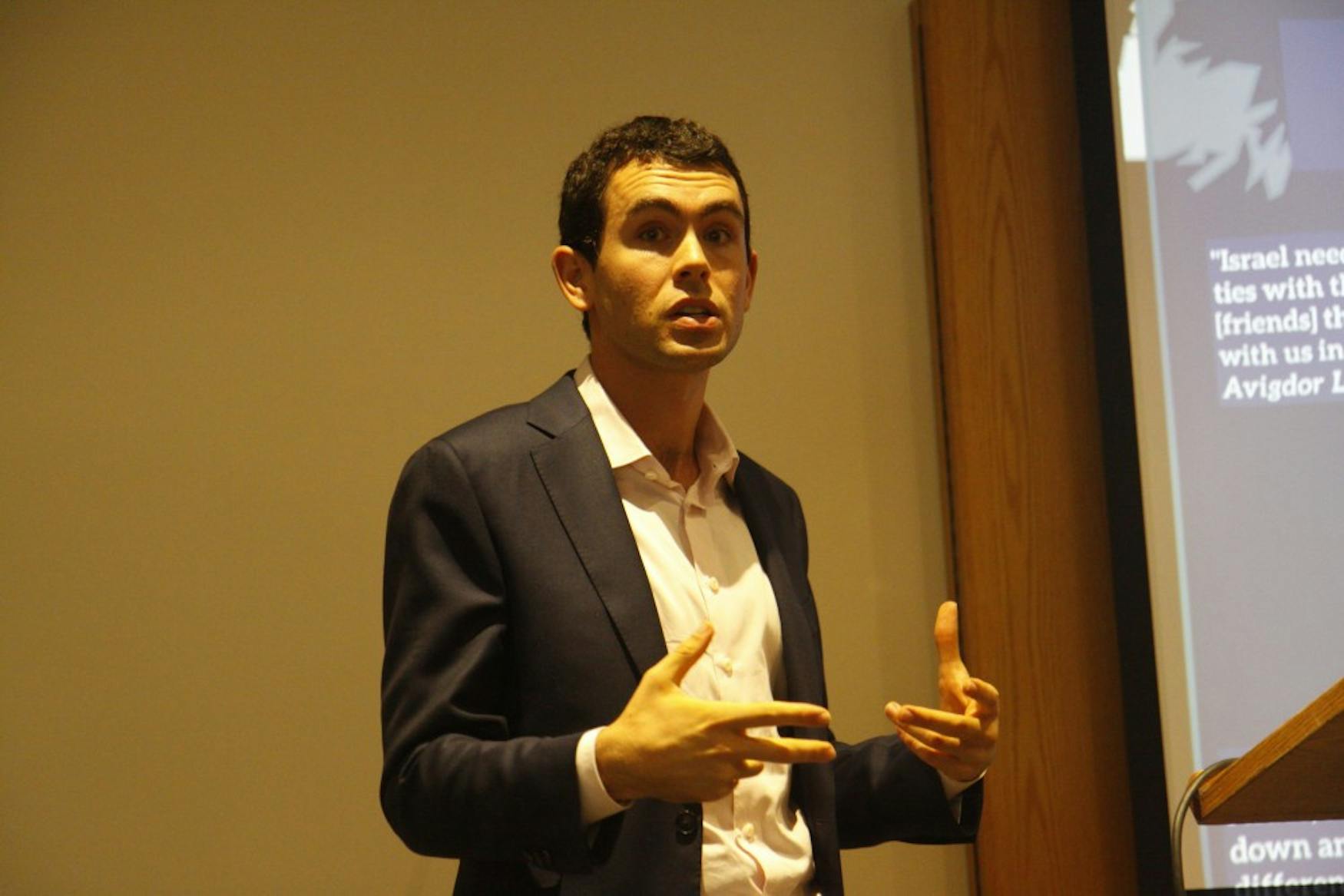Analyst addresses tension between conflicting nations
On Thursday afternoon, Sam Chester, an analyst at KCPS Clarity, a global investment firm in Tel Aviv, Israel spoke about the transforming relationship among Israel, China and the United States. He titled his presentation, “The Israel, China and American Love Triangle; a New Narrative.”
Chester, a graduate of Johns Hopkins University, has consulted for Chinese companies in China, Saudi Arabia, Qatar and Bahrain. He is currently one of the leading experts in Israeli-Chinese relations.
Chester focused on Israel’s shifting role in the tri-national “love triangle.”
He explained that as relations between the U.S. and China began to deteriorate in the 1980s, Israeli-Chinese relations began to blossom. He cited the example of the Tiananmen Square Massacre in June 1989 when, in response to the Chinese government’s violent treatment of civilians, the U.S. imposed a number of economic sanctions on China including a reduction in weapons sales. It was at this point, Chester noted, that the Israeli government enabled China to circumvent the sanctions by independently selling them munitions.
Chester explained that, because of its bitterness toward China, the U.S. became wary of strengthening Israeli-Chinese ties. Chester cited an incident in 2000 when the U.S. threatened to cut off $2.8 billion in funding to Israel if they sold their Phalcon Airborne Warning and Control system to China. He described this incident as the “lowest point in Israel’s diplomatic relations with any country.”
Chester stated that tensions between the three nations peaked in 2005 when the Pentagon prohibited the Israelis from upgrading the Harpy Drone System they had sold to China in the ’90s and forced them to sign an agreement that they would never again sell weapons to China.
Chester described the U.S.-Chinese dynamic over the past couple of decades as a “zero-sum” relationship where the two countries stand in gridlock. He pronounced that Israel’s recent strengthened ties with China have given it more leverage in the “love triangle.”
Chester addressed the significance of recent diplomatic visits between Israeli and Chinese officials. He said he believed Israeli Prime Minister Benjamin Netanyahu’s visit to China in May 2013 had major implications for the two countries’ future affairs.
Upon his visit, Netanyahu signed multiple agreements, including a $400 million trade agreement with China. “When Netanyahu visited China, the entire focus was on business ties. That’s what’s bringing Israel and China together.” He also mentioned that although Chinese President Xi Jinping has yet to visit Israel, “a week does not go by without a delegation of Chinese officials coming to visit Israel.”
Secondly, Chester focused on the rise in trade between the two countries. “The current renaissance in Israel and China is rooted in business,” he said.
He provided statistics showing that within the past four years, trade between China and Israel has reached an annual level of nearly $10 billion per year. “Two days of trade nowadays is approximately equivalent to the entire value of trade in 1992,” he remarked.
Chester also said that “the Chinese have been looking at the Eastern Mediterranean as a strategic region for trade with Europe and Africa.” He cited the “Red Med” plan—an Israeli-Chinese proposition to build a railway trade route through Israel from the Red Sea to the Mediterranean—as a primary example.
Finally, Chester highlighted the growth in partnership between Israeli and Chinese entrepreneurs. He explained that because Israel and China share many overlapping concerns about natural resources and security, several Chinese businesses are very eager to partner with Israeli innovators in five main sectors: alternative energy sources, medical technology, desalination and waste water treatment, agricultural innovation and cyber security.
Chester said that he did not foresee an imminent amicable relationship among Israel, China and the United States. He did, however, express hope that economic and political cooperation among the three countries could be fostered through a technology education program implemented by Chinese billionaire and philanthropist Li Ka Shing. Li donated almost $200 million of to the Technion University in Haifa, Israel, and his donation was contingent upon the condition that the Technion build two satellite campuses in Guangdang, China and Roosevelt Island, New York. Chester said he was optimistic that this project would encourage business cooperation among all three countries.
Chester believes that Brandeis students stand in a unique position to enrich education, business and personal ties within this “love triangle.” As a U.S.-based university with large percentages of both Jewish and Chinese students, Chester identified Brandeis as an excellent breeding ground for relationships among young American, Jewish and Chinese innovators.



Please note All comments are eligible for publication in The Justice.